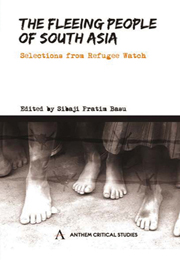Book contents
- Frontmatter
- Contents
- Acronyms and Abbreviations
- Foreword by Ranabir Samaddar
- Preface
- ETHICAL ISSUES
- Introduction
- Ethical Origins of Refugee Rights and Humanitarian Law
- Power, Fear, Ethics
- Victim's Right to Communicate
- The Guiding Principles: Normative Status and its Effective Domestic Implementation
- The Boundaries of Belonging: Reflections on Migration Policies in the Twenty-First Century
- LAWS
- SOUTH ASIA
- INDIA
- GENDER
- INTERVIEW/CORRESPONDENCE
- REPRESENTATIONS
- Index
The Guiding Principles: Normative Status and its Effective Domestic Implementation
from ETHICAL ISSUES
Published online by Cambridge University Press: 05 March 2012
- Frontmatter
- Contents
- Acronyms and Abbreviations
- Foreword by Ranabir Samaddar
- Preface
- ETHICAL ISSUES
- Introduction
- Ethical Origins of Refugee Rights and Humanitarian Law
- Power, Fear, Ethics
- Victim's Right to Communicate
- The Guiding Principles: Normative Status and its Effective Domestic Implementation
- The Boundaries of Belonging: Reflections on Migration Policies in the Twenty-First Century
- LAWS
- SOUTH ASIA
- INDIA
- GENDER
- INTERVIEW/CORRESPONDENCE
- REPRESENTATIONS
- Index
Summary
Text of a public lecture by Robert Kogod Goldman in Kolkata on 16 August 2005.
I would like to thank the Mahanirban Calcutta Research Group (CRG) for inviting me to give a series of lectures touching on issues related to Forced Displacement, the Guiding Principles on Internal Displacement and International Law. […] As I worked very closely with Francis Deng and Walter Kalin in developing the normative framework applicable to Internally Displaced Persons (IDPs), I hope that these lectures will provide some useful insights into the origins, substantive content and normative character, as well as the impact to date, of the Guiding Principles on Internal Displacement.
ORIGIN OF THE UN MANDATE ON IDPs
It was not until the early 1990s that international concern began to increasingly focus on the plight of IDPs, i.e., people forced from their homes as a result of armed conflict, communal violence, serious human rights and humanitarian law abuses and/or natural or man-made disasters and who remain uprooted and at risk within their own countries. Unlike persons who flee across international borders and thereby may be entitled to the status and protective international legal regime applicable to refugees, IDPs remain within their country and, as such, are subject to the jurisdiction of their own government, whose very actions or policies may have caused their displacement and which all too frequently may be unwilling or unable to protect or assist them.
- Type
- Chapter
- Information
- The Fleeing People of South AsiaSelections from Refugee Watch, pp. 37 - 48Publisher: Anthem PressPrint publication year: 2009

